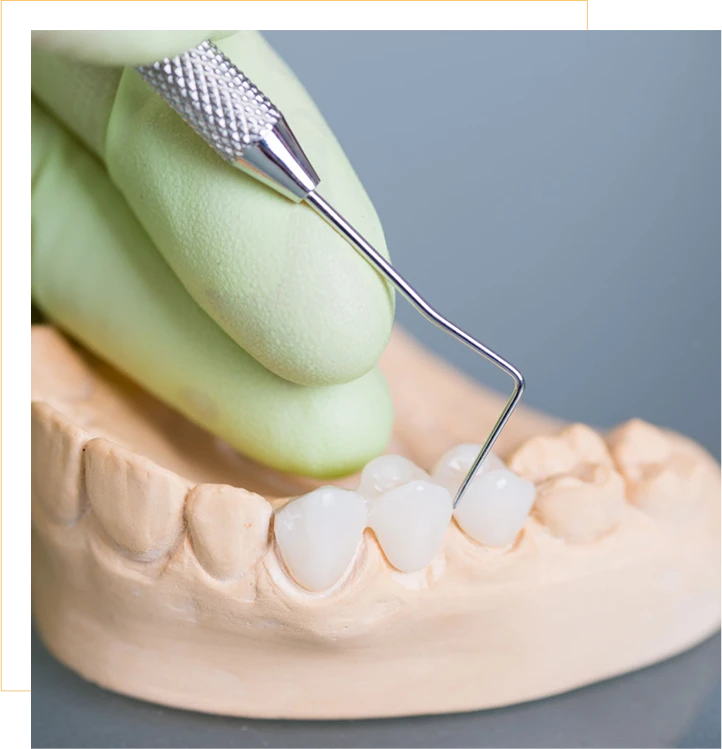

Crowns and Bridges - Union City, CA
Recapture a Natural-Looking and Functioning Smile
Schedule Your Appointment
Get a Dental Crown or Bridge to Restore Your Bite
If you have a severely decayed, weak, or damaged tooth, you’ve found the right practice to make your smile whole again. When you visit Noble Dental Care for a dental crown or bridge, you’ll benefit from our extensive expertise, caring touch, and advanced technologies. As long as the roots and interior of your damaged or broken tooth are healthy, we can restore it with a dental crown in Union City, CA.
And if you have a missing tooth, a dental bridge is a cost-effective alternative to a dental implant. Whether you’re struggling with a broken tooth or need to fill a smile gap, crowns and bridges provide excellent functional and cosmetic benefits.

At Noble Dental Care our dentist and dental team are skilled in these restorative treatments and have the artistic eye to provide aesthetically attractive outcomes, as well as returning function to your tooth.

Dental Crowns Restore Damaged Teeth
A dental crown in Union City, CA is a tooth cap crafted from porcelain or zirconia that restores a compromised tooth’s function, shape, and strength. If a cavity goes unchecked, oral bacteria continues to impact the tooth enamel and dentin. There may not be adequate tooth structure after removing decay to support a filling, in which case a dental crown is required.
When a tooth is too discolored or misshapen to restore with a porcelain veneer , a tooth crown is often the best option. Last, a root canal weakens the
interior tooth structure, and a crown is necessary to protect it from future fracture and extraction.
The process starts by trimming and reshaping your tooth to create an ideal base for the crown. Digital impressions of your bite are taken to craft a
temporary crown on-site and sent to the dental lab to fabricate your final tooth crown.

Dental Crowns Restore Damaged Teeth
A dental crown in Union City, CA is a tooth cap crafted from porcelain or zirconia that restores a compromised tooth’s function, shape, and strength. If a cavity goes unchecked, oral bacteria continues to impact the tooth enamel and dentin. There may not be adequate tooth structure after removing decay to support a filling, in which case a dental crown is required.
When a tooth is too discolored or misshapen to restore with a porcelain veneer , a tooth crown is often the best option. Last, a root canal weakens the
interior tooth structure, and a crown is necessary to protect it from future fracture and extraction.
The process starts by trimming and reshaping your tooth to create an ideal base for the crown. Digital impressions of your bite are taken to craft a
temporary crown on-site and sent to the dental lab to fabricate your final tooth crown.


Dental Bridges Fill Gaps Left by Tooth Loss
A dental bridge in Union City, CA is a fixed prosthetic that bridges the gap left by one or more missing teeth. A dental bridge involves placing crowns on adjacent teeth to anchor the false (pontic) tooth. The process for placing traditional bridges at Noble Dental Care is similar to that of dental crowns.
Dental bridges improve your chewing ability and speech and eliminate sensitivity and issues that can impact adjacent teeth. But unless you receive an implant-supported bridge, bone loss continues under the false tooth without a tooth root to stimulate your jaw bone.
The Benefits of Crowns and Bridges
Improves functionality and aesthetics
Prevents additional dental problems
Distributes bite forces evenly
Prevents shifting of adjacent teeth
Maintains overall oral health

The Varied Cost of Crowns and Bridges
The cost of these procedures varies based on the materials used, the number of teeth being restored, and outside dental lab charges. In addition to expertise in restoring dental function and beauty with crowns and bridges, we offer competitive pricing, accept dental insurance, and partner with leading third-party dental financing companies to deliver affordable restorative dentistry.
